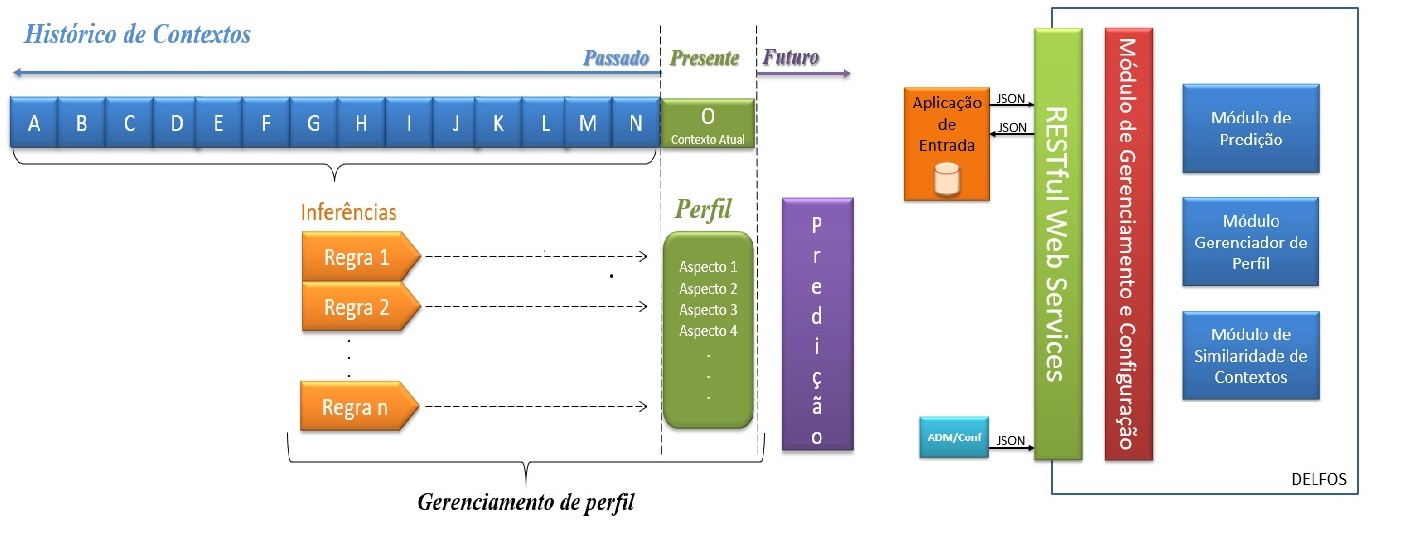DELFOS: A Model for Multitemporal Analysis based on Contexts History
Keywords:
Ubiquitous Computing, Context-aware Computing, Contexts Histories, Contexts Prediction, Similarity Analysis, Profile ManagementAbstract
This paper presents Delfos, a model for multi-temporal analysis based on historical contexts. The article describes the model architecture, implementation, and tests with two real datasets to evaluate the functionality and its potential to real applications. The first scenario used historical data from an electric power transmission substation, and the second with data from the performance analysis of futsal athletes. The results obtained through inference rules perform with 100\% accuracy of the Profiles creation and that these are a better representation of the present, than only the current context data of the application. The results on the prediction of contexts were relevant in the case of the existence of behavior patterns in the contexts of the analyzed entities. For the application related to the electric power transmission substation, the assertiveness was between 86\% and 92\% in a 12-hour interval. In the application of performance analysis of futsal athletes, we made predictions about the athletes’ movement, with results varying between 72\% and 92\% for the time of up to 20 seconds. The results were encouraging and show potential for implementing Delfos in real-life situations.
Downloads
References
J. H. Rosa, J. L. V. Barbosa, M. Kich, and L. Brito, “A multitemporal context-aware system for competences management,” International Journal of Artificial Intelligence in Education, vol. 25, no. 4, pp. 455–492, Dec 2015.
J. Barbosa, “Multi-temporal aspects on contextual variability modeling,” in Anais do XI Simposio Brasileiro de Computac´ ao Ub˜ ´ıqua e Pervasiva. Porto Alegre, RS, Brasil: SBC, 2019.
J. M. Silva, J. H. Rosa, J. L. V. Barbosa, D. N. F. Barbosa, and L. A. M. Palazzo, “Content distribution in trail-aware environments,” Journal of the Brazilian Computer Society, vol. 16, no. 3, pp. 163–176, Sep 2010.
A. Wagner, J. L. V. Barbosa, and D. N. F. Barbosa, “A model for profile management applied to ubiquitous learning environments,” Expert Systems with Applications, vol. 41, no. 4, pp. 2023 – 2034, 2014.
J. H. da Rosa, J. L. Barbosa, and G. D. Ribeiro, “Oracon: An adaptive model for context prediction,” Expert Systems with Applications, vol. 45, pp. 56 – 70, 2016.
C. Voigtmann, S. L. Lau, and K. David, “An approach to collaborative context prediction,” in 2011 IEEE International Conference on Pervasive Computing and Communications Workshops (PERCOM Workshops), March 2011, pp. 438–443.
V. Pejovic and M. Musolesi, “Anticipatory mobile computing: A survey of the state of the art and research challenges,” ACM Comput. Surv., vol. 47, no. 3, pp. 1–29, Apr. 2015.
M. Ballings, D. Van den Poel, N. Hespeels, and R. Gryp, “Evaluating multiple classifiers for stock price direction prediction,” Expert Syst. Appl., vol. 42, no. 20, pp. 7046–7056, Nov. 2015.
J. Xu, D. Deng, U. Demiryurek, C. Shahabi, and M. v. d. Schaar, “Context-aware online spatiotemporal traffic prediction,” in 2014 IEEE International Conference on Data Mining Workshop, Dec 2014, pp. 43– 46.
R. Shaptala and A. Kyselova, “Location prediction approach for contextaware energy management system,” in 2016 IEEE 36th International Conference on Electronics and Nanotechnology (ELNANO), April 2016, pp. 333–336.
W. Maalej, M. Ellmann, and R. Robbes, “Using contexts similarity to predict relationships between tasks,” Journal of Systems and Software, vol. 128, pp. 267 – 284, 2017.
T. K. L. Hui and R. S. Sherratt, “Towards disappearing user interfaces for ubiquitous computing: human enhancement from sixth sense to super senses,” Journal of Ambient Intelligence and Humanized Computing, vol. 8, no. 3, pp. 449–465, Jun 2017.
D. Dupont, J. L. V. Barbosa, and B. M. Alves, “Chspam: a multi-domain model for sequential pattern discovery and monitoring in contexts histories,” Pattern Analysis and Applications, pp. 1–10, Jun 2019.
A. K. Dey, G. D. Abowd, and D. Salber, “A conceptual framework and a toolkit for supporting the rapid prototyping of context-aware applications,” Hum.-Comput. Interact., vol. 16, no. 2, pp. 97–166, Dec. 2001.
H. Hemmati, A. Arcuri, and L. Briand, “Achieving scalable model-based testing through test case diversity,” ACM Trans. Softw. Eng. Methodol., vol. 22, no. 1, pp. 1–42, Mar. 2013.
S.-H. Cha, “Comprehensive survey on distance/similarity measures between probability density functions,” International Journal of Mathematical Models and Methods in Applied Sciences, vol. 1, no. 4, pp. 300–307, 2007.
E. Fredkin, “Trie memory,” Commun. ACM, vol. 3, no. 9, p. 490–499, Sep. 1960.
J. Grus, Data Science from Scratch: First Principles with Python. Beijing: O’Reilly, 2015.


